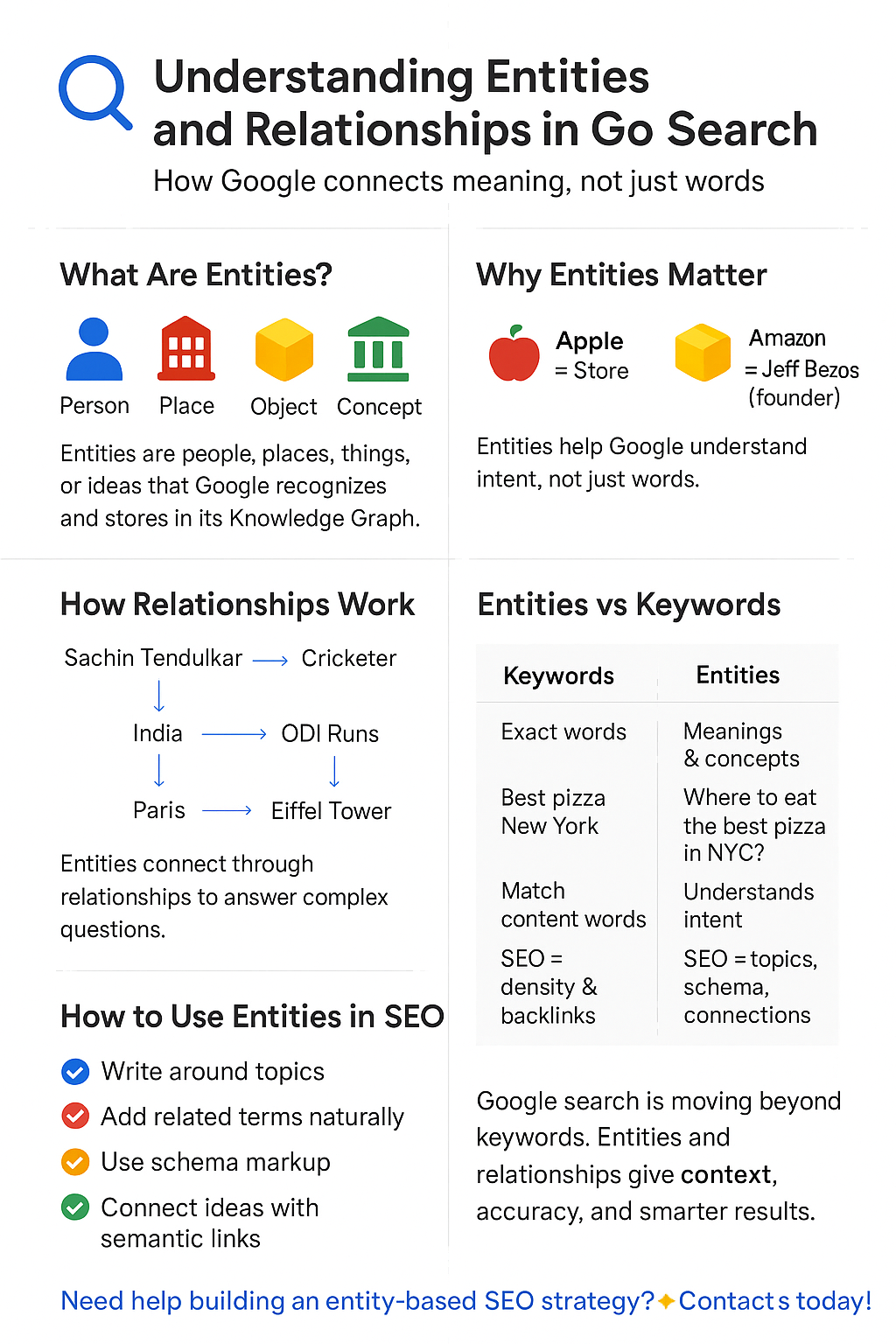Google search has undergone significant changes since the days of keyword matching. Today, it relies on entities and their relationships to better understand what people are asking. This approach makes the search more intelligent and more focused on meaning instead of just words.
What Are Entities in Google Search?
An entity is any clearly defined thing that Google can recognize. It could be:
- A person (e.g., “Mahatma Gandhi”)
- A place (e.g., “New Delhi”)
- An object (e.g., “Taj Mahal”)
- A concept (e.g., “digital marketing”)
- An organization (e.g., “Google”)
Entities are stored in Google’s Knowledge Graph, which connects them with facts, attributes, and related topics.
Why Do Entities Matter?
Instead of only reading keywords, Google now understands context. For example:
- Searching “Apple near me” → Google knows you probably mean Apple store, not the fruit.
- Searching “Amazon founder” → Google links the entity Amazon with the entity Jeff Bezos.
This helps Google give faster, more accurate results that match search intent.
How Relationships Work
Entities don’t exist in isolation — they are always connected to other entities through relationships.
For example:
- Sachin Tendulkar → is a cricketer → who played for India → and scored many runs in ODI matches.
- Paris → is the capital of France → home to the Eiffel Tower → and a major tourist attraction.
These connections help Google understand context and meaning. That’s why, when someone asks a complex question like “Who was the first Indian cricketer to score 200 runs in an ODI?”, Google can connect the dots between entities and their relationships to provide the correct answer.

How Semantic SEO Works with Entities and Relationships in Google’s Search
Semantic SEO is about creating content that search engines can understand in context, not just match by keywords. It taps into Google’s use of entities (people, places, things, concepts) and relationships (how those entities connect).
How Semantic SEO Uses This
When you apply Semantic SEO, you:
- Cover a topic deeply instead of just repeating a keyword.
- Use related entities (e.g., for cricket: players, records, matches, teams) to show Google how your content fits into the knowledge graph.
- Create natural connections between concepts so your content matches how people search.
4. Why It Matters
With entities and relationships, Google can:
- Understand the intent behind a search, not just the words typed.
- Deliver more accurate results, even for vague or conversational queries.
- Highlight content that provides context, clarity, and depth.
For SEO, this means your content is more likely to rank if it:
- Explains the what, who, why, and how of a topic.
- Uses structured data (schema markup) to reinforce entity connections.
- Naturally answers the questions people are asking about the topic.
Entities vs Keywords (Comparison Table)
| Factor | Keywords (Old SEO) | Entities (Modern SEO) |
|---|---|---|
| Focus | Exact words typed | Meanings, concepts, relationships |
| Example Query | “best pizza New York” | “Where can I eat the best pizza in NYC?” |
| Google’s Approach | Match words in content | Understand intent and connect entities |
| SEO Strategy | Keyword density, backlinks | Topic clusters, schema, semantic connections |
How This Impacts Organic SEO
For your content to rank today, it’s not enough to repeat the exact keywords. Google looks for meaning, relevance, and how well your content fits into the bigger picture of entities and relationships.
Instead, you should:
- Focus on topics, not just keywords – Write content that fully answers user questions, not just content stuffed with phrases.
- Build clear connections – Link your content to related entities (people, places, things, events) so Google can understand context.
- Use natural language – Structure your writing the way people search and speak.
- Add supporting details – Facts, examples, and context make your content more trustworthy.
- By doing this, you help search engines see your content as part of the knowledge network—making it more likely to show up for relevant searches.
FAQs
Q1. What is an entity in SEO?
An entity is any person, place, object, or concept that Google can identify and store in its Knowledge Graph.
Q2. How do entities affect search rankings?
They help Google understand meaning, so content that covers topics clearly and connects related ideas ranks better.
Q3. What is the difference between entities and keywords?
Keywords are words people type, while entities are recognized concepts linked with context and facts.
Q4. How can I use entities in my content?
Write around topics, use related terms naturally, add schema markup, and build clear connections in your writing.
Q5. Is entity-based SEO replacing keywords?
Not fully. Keywords still matter, but entities give Google a deeper understanding of the query.
Conclusion
Google’s shift to entities and relationships has made search more intelligent. For businesses and website owners, this means creating content that answers real questions, connects related ideas, and speaks in natural language.
If you want help shaping an entity-focused SEO strategy, feel free to contact me today.





